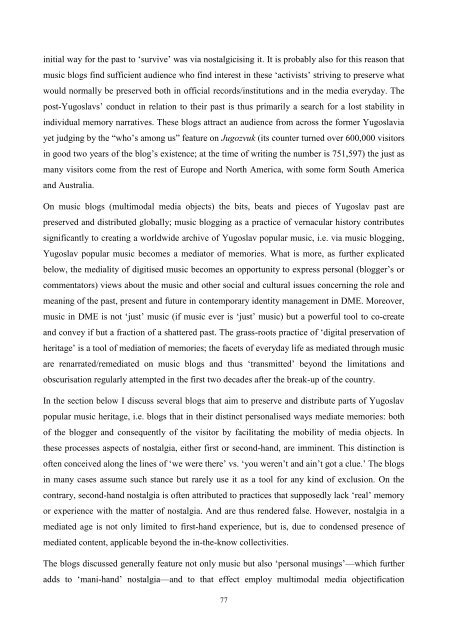UNIVERSITY OF NOVA GORICA GRADUATE SCHOOL ...
UNIVERSITY OF NOVA GORICA GRADUATE SCHOOL ...
UNIVERSITY OF NOVA GORICA GRADUATE SCHOOL ...
Create successful ePaper yourself
Turn your PDF publications into a flip-book with our unique Google optimized e-Paper software.
initial way for the past to ‗survive‘ was via nostalgicising it. It is probably also for this reason that<br />
music blogs find sufficient audience who find interest in these ‗activists‘ striving to preserve what<br />
would normally be preserved both in official records/institutions and in the media everyday. The<br />
post-Yugoslavs‘ conduct in relation to their past is thus primarily a search for a lost stability in<br />
individual memory narratives. These blogs attract an audience from across the former Yugoslavia<br />
yet judging by the ―who‘s among us‖ feature on Jugozvuk (its counter turned over 600,000 visitors<br />
in good two years of the blog‘s existence; at the time of writing the number is 751,597) the just as<br />
many visitors come from the rest of Europe and North America, with some form South America<br />
and Australia.<br />
On music blogs (multimodal media objects) the bits, beats and pieces of Yugoslav past are<br />
preserved and distributed globally; music blogging as a practice of vernacular history contributes<br />
significantly to creating a worldwide archive of Yugoslav popular music, i.e. via music blogging,<br />
Yugoslav popular music becomes a mediator of memories. What is more, as further explicated<br />
below, the mediality of digitised music becomes an opportunity to express personal (blogger‘s or<br />
commentators) views about the music and other social and cultural issues concerning the role and<br />
meaning of the past, present and future in contemporary identity management in DME. Moreover,<br />
music in DME is not ‗just‘ music (if music ever is ‗just‘ music) but a powerful tool to co-create<br />
and convey if but a fraction of a shattered past. The grass-roots practice of ‗digital preservation of<br />
heritage‘ is a tool of mediation of memories; the facets of everyday life as mediated through music<br />
are renarrated/remediated on music blogs and thus ‗transmitted‘ beyond the limitations and<br />
obscurisation regularly attempted in the first two decades after the break-up of the country.<br />
In the section below I discuss several blogs that aim to preserve and distribute parts of Yugoslav<br />
popular music heritage, i.e. blogs that in their distinct personalised ways mediate memories: both<br />
of the blogger and consequently of the visitor by facilitating the mobility of media objects. In<br />
these processes aspects of nostalgia, either first or second-hand, are imminent. This distinction is<br />
often conceived along the lines of ‗we were there‘ vs. ‗you weren‘t and ain‘t got a clue.‘ The blogs<br />
in many cases assume such stance but rarely use it as a tool for any kind of exclusion. On the<br />
contrary, second-hand nostalgia is often attributed to practices that supposedly lack ‗real‘ memory<br />
or experience with the matter of nostalgia. And are thus rendered false. However, nostalgia in a<br />
mediated age is not only limited to first-hand experience, but is, due to condensed presence of<br />
mediated content, applicable beyond the in-the-know collectivities.<br />
The blogs discussed generally feature not only music but also ‗personal musings‘—which further<br />
adds to ‗mani-hand‘ nostalgia—and to that effect employ multimodal media objectification<br />
77

















